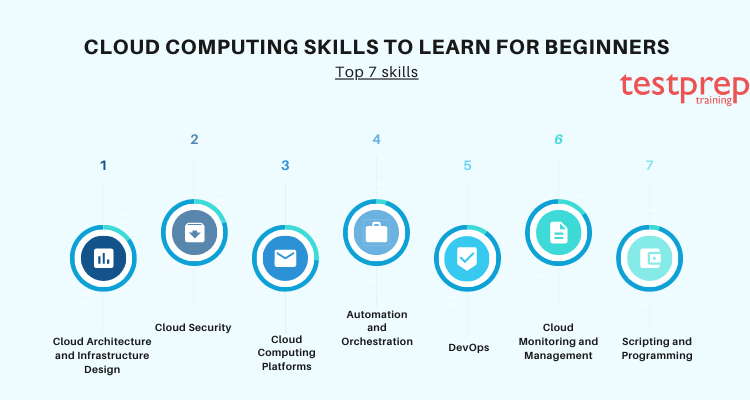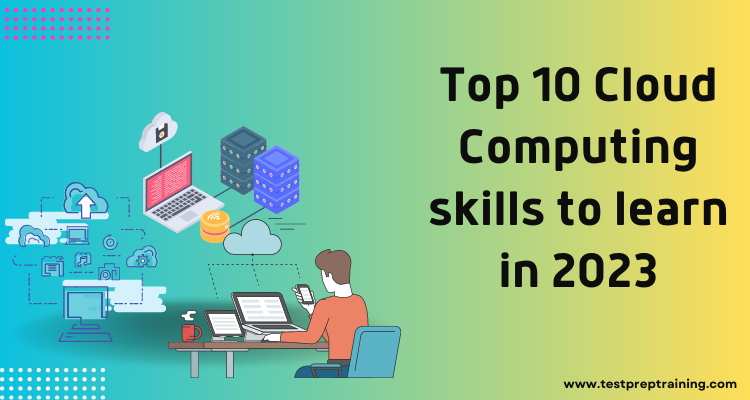Cloud computing has been transforming how organizations operate and manage their IT infrastructure for many years. As we enter 2023, it’s safe to say that cloud computing is no longer a novelty; it’s a necessity. The demand for cloud computing skills will only grow in the coming years, making it an excellent career choice for anyone looking to enter the tech industry. In this blog, we will discuss the top 10 cloud computing skills that beginners should learn in 2023.
Why there is growing importance of Cloud Computing?
In today’s technology-driven world, cloud computing has become increasingly important due to its numerous advantages and benefits. Here are some key points highlighting its growing significance:
- Scalability and Flexibility: Cloud computing allows businesses to scale their infrastructure and resources up or down based on their needs. This flexibility enables organizations to quickly adapt to changing demands and handle fluctuating workloads effectively.
- Cost Efficiency: Cloud computing eliminates the need for upfront hardware investments and reduces the costs associated with maintaining and managing on-premises infrastructure. Organizations can pay for the resources they use, resulting in cost savings and improved financial efficiency.
- Accessibility and Collaboration: Cloud computing enables users to access data, applications, and services from anywhere, anytime, as long as they have an internet connection. This accessibility fosters collaboration among teams and facilitates remote work, enhancing productivity and efficiency.
- Data Backup and Disaster Recovery: Cloud providers offer robust data backup and disaster recovery mechanisms, ensuring the safety and availability of critical business data. This eliminates the need for organizations to invest heavily in their own backup infrastructure and provides peace of mind in the event of data loss or system failures.
- Innovation and Agility: Cloud computing provides a platform for innovation by offering a wide range of services, tools, and APIs. It allows developers to experiment, prototype, and deploy applications rapidly, accelerating the pace of innovation and time-to-market.
- Global Reach and Scalability: Cloud providers have a global network of data centers, allowing businesses to expand their operations and reach customers in different geographic locations easily. The scalability of cloud infrastructure enables organizations to handle large-scale operations and serve a global customer base efficiently.
- Security and Compliance: Cloud providers invest heavily in security measures and compliance certifications to protect data and ensure regulatory compliance. They employ robust security controls, encryption, and monitoring mechanisms to safeguard sensitive information.
- Environmental Sustainability: Cloud computing promotes environmental sustainability by optimizing resource utilization and reducing energy consumption. Cloud providers operate data centers more efficiently than traditional on-premises infrastructure, leading to reduced carbon footprint and energy consumption.
Top 10 Cloud Computing Skills to Learn in 2023 for Beginners
Cloud computing has been one of the most revolutionary technologies of the past decade, and its impact on the tech industry and businesses of all sizes is only growing. These are the top 10 skills –

Cloud Architecture and Infrastructure Design
One of the most critical skills for cloud computing is understanding cloud architecture and infrastructure design. As a beginner, it is essential to learn how to design and implement cloud-based infrastructure. This includes learning about the different cloud models, such as public, private, and hybrid clouds. Knowledge of cloud service models such as SaaS, PaaS, and IaaS is also necessary. A beginner must also have a thorough understanding of cloud deployment models like containers, serverless, and virtual machines.
Cloud Security
Cloud security is crucial for any business or individual who stores data in the cloud. As a beginner, you must learn about the different security principles in the cloud, such as encryption, authentication, and authorization. You must also have a good understanding of network security, data security, and compliance standards such as HIPAA, GDPR, and PCI-DSS. Security is a top priority for businesses, and having a strong understanding of cloud security principles will make you a valuable asset in the industry.
Cloud Computing Platforms
There are several cloud computing platforms available today, such as Amazon Web Services (AWS), Microsoft Azure, and Google Cloud Platform. As a beginner, you must learn about these platforms and understand their features, strengths, and weaknesses. You should also learn about the different services these platforms offer, such as storage, compute, networking, and database services.
Automation and Orchestration
Automation and orchestration skills are essential in cloud computing. You must learn about tools like Ansible, Puppet, and Chef to automate infrastructure and configuration management. You should also learn about container orchestration tools like Kubernetes, Docker Swarm, and Amazon ECS to manage containers in the cloud.
DevOps
DevOps combines development and operations practices that help businesses deliver high-quality software products quickly and efficiently. As a beginner, you must learn about DevOps principles, tools, and practices. This includes continuous integration and deployment (CI/CD) tools like Jenkins, Git, and CircleCI.
Cloud Monitoring and Management
Cloud monitoring and management skills are crucial for maintaining the performance and availability of cloud infrastructure. As a beginner, you must learn about cloud monitoring tools like Nagios, Prometheus, and Grafana. You should also learn about cloud management tools like AWS Management Console, Azure Portal, and Google Cloud Console.
Scripting and Programming
Scripting and programming skills are essential in cloud computing. As a beginner, you must learn about programming languages such as Python, Ruby, and Java. You should also learn about scripting languages such as Bash and PowerShell.
- Cloud Networking
Networking is an essential component of cloud computing. As a beginner, you must learn about cloud networking principles such as virtual private networks (VPNs), load balancing, and content delivery networks (CDNs). You should also learn about networking tools like Amazon VPC, Azure Virtual Network, and Google Cloud VPC.
Cloud Storage
Cloud storage is a critical component of cloud computing. As a beginner, you must learn about different types of cloud storage, such as object storage, file storage, and block storage. You should also learn about cloud storage services like Amazon S3, Azure Blob Storage, and Google Cloud Storage.
Machine Learning and Artificial Intelligence
Machine learning and artificial intelligence (AI) are rapidly growing areas within cloud computing. As a beginner, it is important to learn about machine learning and AI principles, algorithms, and tools. This includes learning about popular machine learning frameworks like TensorFlow and PyTorch, as well as AI services like Amazon SageMaker, Azure Machine Learning, and Google Cloud AI.
Career Opportunities and Benefits
Acquiring cloud computing skills can open up a wide range of career opportunities and offer numerous benefits for professionals in the technology industry. Here are some key points highlighting the career opportunities and benefits associated with acquiring cloud computing skills:
- High Demand for Cloud Professionals: The demand for cloud computing professionals is on the rise as businesses increasingly adopt cloud technologies. Organizations across various industries are actively seeking skilled cloud professionals to help them migrate, manage, and optimize their cloud infrastructure.
- Diverse Range of Job Roles: Cloud computing skills offer a diverse range of job roles to choose from. Some popular roles include cloud architect, cloud engineer, cloud developer, DevOps engineer, solutions architect, cloud security specialist, and data engineer. These roles span across different levels of expertise and provide opportunities for specialization.
- Lucrative Salaries: Cloud computing professionals often command competitive salaries due to their specialized skills and high demand. As organizations rely more on cloud technologies, they are willing to invest in skilled professionals who can effectively manage and optimize their cloud infrastructure.
- Career Growth and Advancement: Cloud computing offers ample opportunities for career growth and advancement. Professionals can enhance their skills, gain experience with different cloud platforms, and earn relevant certifications to advance their careers. They can progress to leadership positions or specialize in specific areas like cloud security, big data analytics, or machine learning.
- Versatility and Transferable Skills: Cloud computing skills are highly transferable across industries and organizations. Whether it’s healthcare, finance, e-commerce, or government sectors, cloud professionals can leverage their skills to work in various domains. This versatility provides flexibility and widens the range of potential job opportunities.
- Continuous Learning and Innovation: Cloud computing is a rapidly evolving field that constantly introduces new technologies, services, and best practices. Acquiring cloud computing skills requires continuous learning and staying updated with the latest trends, fostering a culture of lifelong learning and innovation.
- Remote Work Opportunities: Cloud computing skills align well with remote work opportunities. Many cloud-related tasks can be performed remotely, allowing professionals to work from anywhere in the world. This flexibility provides a better work-life balance and opens up possibilities for remote or freelance work arrangements.
- Industry Recognition and Credibility: Obtaining certifications from leading cloud providers, such as AWS, Azure, or GCP, enhances professional credibility and validates cloud computing skills. These certifications demonstrate expertise and proficiency in managing cloud infrastructure and are recognized by employers globally.
- Exposure to Emerging Technologies: Cloud computing often intersects with emerging technologies such as artificial intelligence, machine learning, Internet of Things (IoT), and blockchain. Acquiring cloud skills can provide professionals with opportunities to work on cutting-edge projects and gain exposure to these exciting technologies.
- Contributing to Digital Transformation: Cloud computing plays a crucial role in driving digital transformation for organizations. By acquiring cloud skills, professionals can actively contribute to the transformation efforts of businesses, helping them leverage the power of cloud technologies to improve efficiency, scalability, and innovation.
Now, let’s look at some popular certifications to get you started.
Popular Certifications for Beginners | Cloud Computing
Cloud computing is a rapidly growing field; several certifications can help beginners gain the necessary skills to become a cloud engineer. Here are a few popular certifications to consider in 2023:
- AWS Certified Solutions Architect – Associate: Amazon Web Services (AWS) certification is designed for individuals who want to become proficient in designing and deploying scalable, highly available, and fault-tolerant systems on AWS. It covers various topics, including AWS architecture, deployment, and security.
- Microsoft Certified: Azure Solutions Architect Expert: This certification from Microsoft is designed for individuals who want to become proficient in designing and implementing solutions on Microsoft Azure. It covers various topics, including Azure architecture, deployment, and security.
- Google Cloud Certified – Professional Cloud Architect: This certification from Google Cloud is designed for individuals who want to become proficient in designing and deploying scalable, highly available, and fault-tolerant systems on Google Cloud Platform. It covers various topics, including GCP architecture, deployment, and security.
- CompTIA Cloud+: This certification from CompTIA covers a range of cloud computing topics, including deployment, security, and automation. It is vendor-neutral, which means it covers a range of cloud platforms, including AWS, Azure, and Google Cloud.
- Certified Cloud Security Professional (CCSP): This certification from (ISC)² is designed for individuals who want to become proficient in cloud security. It covers various topics, including cloud architecture, security, and compliance.
These certifications can help beginners gain the necessary skills and knowledge to become proficient cloud engineers. They are recognized by industry leaders and can help increase job prospects and salary potential.
Conclusion
Cloud computing is a rapidly growing field with many skills and technologies to learn. As a beginner, it is essential to focus on the fundamentals of cloud architecture and infrastructure design, security, cloud computing platforms, automation and orchestration, DevOps, cloud monitoring and management, scripting and programming, cloud networking, cloud storage, and machine learning and AI. With these skills, you will be well on your way to building a successful career in cloud computing in 2023 and beyond.


